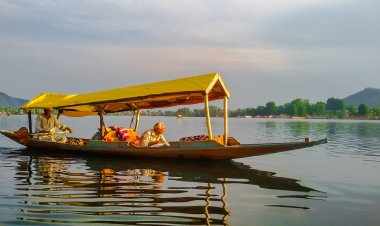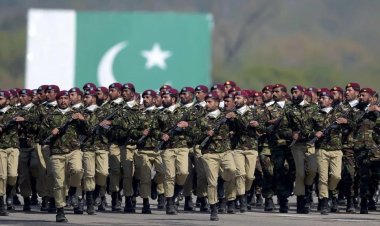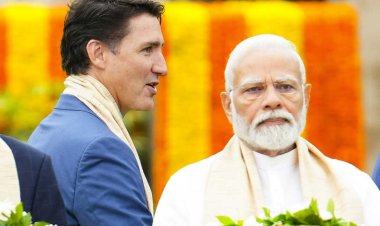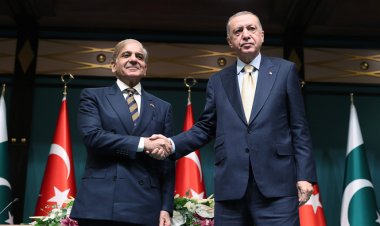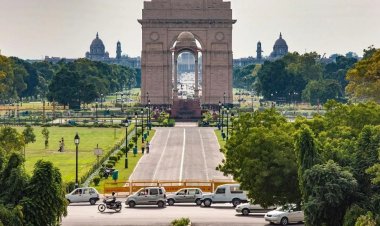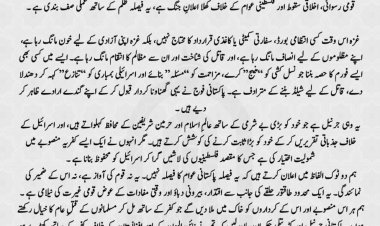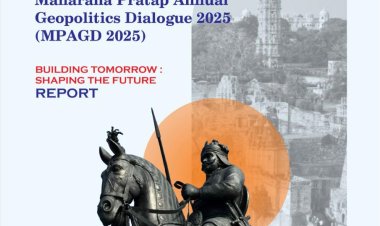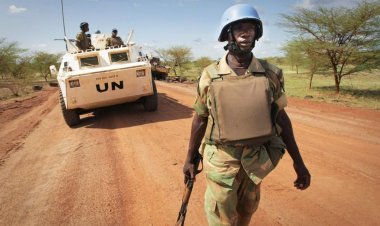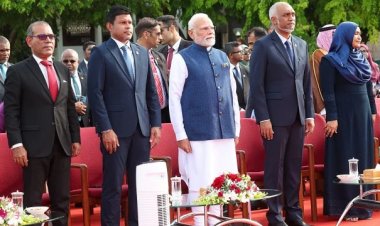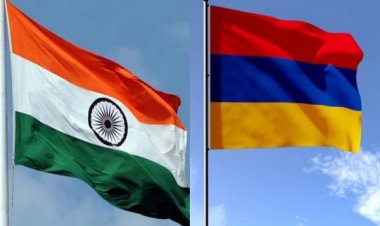Book Discussion : 'Tibet Brief 20/20' organized by Usanas Foundation
On 10th February 2021, Usanas Foundation organized a book discussion event, wherein the celebrated work of eminent authors Dr. Michael Van Walt Van Praag and Miek Boltjes titled 'Tibet Brief 20/20' was discussed.
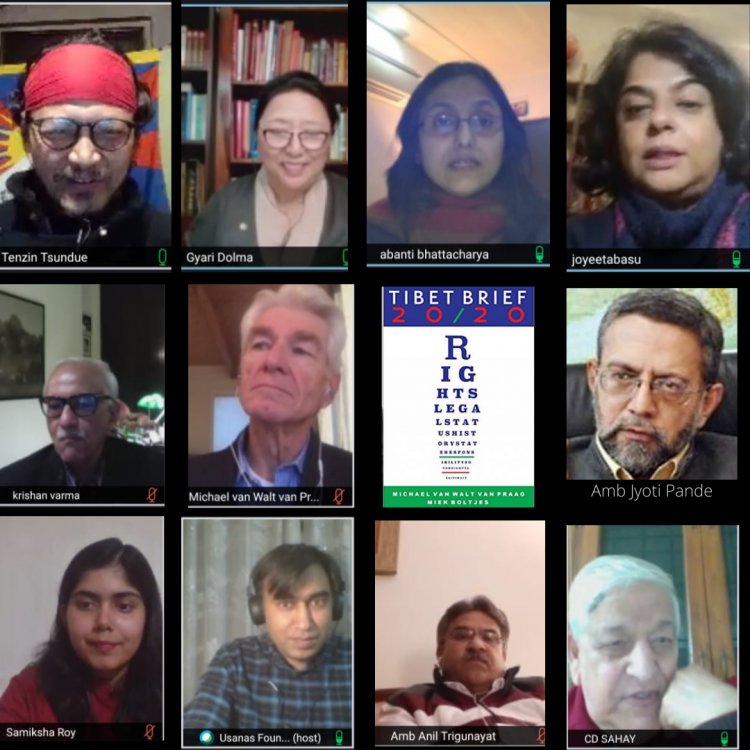
Webinar Report
By Usanas Foundation
On 10th February 2021, Usanas Foundation organized a book discussion event, wherein the celebrated work of eminent authors Dr. Michael Van Walt Van Praag and Miek Boltjes titled 'Tibet Brief 20/20' was discussed. Dr. Michael Van Walt is an international lawyer, a mediator and advisor in intrastate peace processes, and professor of international law and international relations. The event was attended by a number of distinguished personalities from India and across the world including Former RAW chief and a distinguished fellow of Vivekananda International Foundation Mr. C.D.Sahay, Tibetan politician in exile and activist Gyari Dolma, former diplomat Ambassador Jyoti Pande, former diplomat and a distinguished fellow of Vivekananda International Foundation Ambassador Anil Trigunayat, Professor at Delhi University Dr. Abanti Bhattacharya, Tibetan activist and writer Tenzin Tsundue, former Special Secretary with Government of India Krishan Verma, and Editor of The Sunday Guardian, Joyeeta Basu. The event was moderated by Ms. Samiksha Roy, Research Assistant at Usanas Foundation.
During his briefing on the book, Dr. Michael Van Walt talked about how contrary to what Beijing claims and what many people believe, Tibet was never part of China. There are no legal bases for the PRC presence in and rule of Tibet and its claim is solely based on 'self-serving historical narrative'. Tibet is an occupied country, and the PRC does not possess sovereignty over it. He further discusses India's role in the whole scenario and puts forward the three major policy recommendations for the international community regarding Tibet policy. He explained that these are important especially for India, since not only Tibet but the entire Himalayan region is of utmost importance for Indian geopolitical interests, and course-correcting policy on Tibet secures those interests. In the first place, the Tibet issue should be treated as an unresolved international conflict. The international community has an obligation under international law to help resolve the Sino-Tibetan conflict and not to help China consolidate its control in Tibet.
Secondly, governments need to actively counter the Chinese historical narrative, which is an integral part of China's strategy on Tibet, which is misleading the world. Not contesting this has made it significantly harder to challenge other narratives such as the one on the South China Sea and China’s claims to Indian Territory. It would be of critical importance for India to bust the narrative and try to project the real narrative on Tibet.
Thirdly, international law obligates states not to recognise territory taken by force. India has since recently no longer made statements that it recognizes Tibet as part of China. Late last year, the US Department of State referred to Tibet as an 'occupied territory' in a staff report. Both are significant moves. India and the whole world should not succumb to China’s pressure. This would strengthen India's position and help to resolve the Sino-Tibetan conflict. He further argued, "India has a special role to play when it comes to the Tibet issue. Other countries look towards India for guidance on their Tibet policy. India does have a significant effect on the world’s Tibet policies. We have paid a high price for appeasing China and remaining silent on Tibet. China has become an entitled bully.
The only way to stop bullying is by ending the compliance with the bully's demands. This has started and we can see that the world increasingly countering Chinese aggression and pressure. The need now is to build alliances to counter China’s bullying. When we started writing this book, such a climate didn't exist. But governments have increasingly started to stand up against China’s pressure.
I would like to highlight two things when it comes to the obligations of China under international laws. China needs to end the occupation of Tibet and permit the Tibetans to exercise their right to self-determination. China uses smart and selective vocabulary and manipulates international law to cover up its aggression. The world should not conform to the Chinese vocabulary on Tibet, because it is misleading and has legal consequences. International law was created and is jointly maintained by states for securing and protecting collective interests. Jointly harnessing international law to help resolve the Sino-Tibetan conflict is currently the smartest thing to do and serves India’s interests.
The Central Tibetan Administration (CTA) has not made the concession that Tibet is an integral part of China. His Holiness Dalai Lama and the CTA have offered the Chinese government to negotiate over the conflict that would result in accepting a robust autonomy within PRC. I don't think that we can assume that the Tibetan side has made a concession and started to believe that Tibet is a part of China. The middle way approach means that conflict needs to be resolved non-violently, through dialogue and negotiation to find a mutually beneficial solution.
Personally, seeing the way China is behaving in Tibet, East Turkestan, Hong Kong, Inner Mongolia etc. I find it difficult to see how China would respect even a favourable and robust autonomy even if they agree to come to an agreement. I feel it difficult to believe that this would actually work." He concluded by arguing - "as Pandit Nehru had said - it is for the Tibetans themselves to decide their destiny. And the best way to do this is allowing them to exercise their right to self -determination."
Sharing the story of his struggle for Tibetan independence and thoughts about the liberation movement, Mr. Tenzin Tsundue said, "They are our enemy and are destroying our country. We are not going to give up and would recreate the freedom movement in Tibet. The author is so right to say that what China does is manipulate the narrative to justify its occupation. Hundreds of immolations have happened in Tibet, and numerous uprisings have taken place. The author's advice that the Tibetans or the Tibetan government in exile must not buckle under Chinese pressure and completely leave appealing China and playing up to China's politics is exactly on the point. It would certainly be undermining the trust of Tibetans. I am a Tibetan born and educated in India, waiting for the independence of Tibet. I feel pain when India is not speaking up for Tibet. I want India to protect its borders from China. One of the problems in fulfilling the commitment to the Tibetan independence movement is the ignorance amongst Indians on the Tibet issue. A lot of people in India have been believing in the slogan of 'Hindi-Chini Bhai-Bhai'. No Indian textbooks talk about Tibet. They do talk about Burma, Bhutan, Bangladesh, and other countries. But nothing about Tibet. Hence, without the knowledge of Tibet, how would people stand up for its independence? From 12th February, in the new year, I am leading a path yatra from Dharamshala to Delhi to make people aware of the Tibet issue."
Further, Gyari Dolma said that this book will help the Tibetans to come out of 'self-censorship'. She further argued, "We have gradually fallen into a trap. I don't speak on the behalf of the CTA and just as a Tibetan. We are sometimes too cautious to speak on certain topics which are essential because we don't want to offend somebody and believe that this act would push the other side to come and sit on the negotiation table. Both the countries - Tibet and India, must come out of self-censorship, especially on the historical aspect of Tibet. We need to correct the narrative that Tibet today is an illegally occupied nation by the PRC. When I emphasize on this fact that it's time for the Government of India to really come out and recognize Tibet as an occupied nation and for the reason of 1914 Shimla agreement and the usage of such words, I really request everybody to refer to the India-Tibet border as Indo-Tibet border and not as Sino-Indian border. We need to correct all the narratives. If India recognizes Tibet as an independent nation, as it would not necessarily mean contradicting the "One China policy."
Mr. CD Sahay underlined that the main issue is – "Was a wrong done? If a wrong was done, can it get time-barred by international law?" The issue then comes when and how do people agree to this formulation that Tibet remains an illegally occupied territory? How much support is there within Tibet for this proposition? Even at different platforms available, there are lots of efforts being made continuously over the years by the PRC government to discourage people and countries from talking about this. We would need to think on and ensure how we propose to keep this debate going and make people speak, write, and act in the later stage.
Ambassdor Anil Trigunayat recalled an anecdote of meeting His Holiness Dalai Lama during his posting as a diplomat in Mongolia. He stated - "I had the great pleasure of meeting His Holiness and seeking his blessings. I fully agree with all the three suggestions of the author. But there must be much more than these. India has also hosted numerous Tibetans, and that is a major bone of contention between the two countries. The two things that India has done now are the abrogation of Article 370 and standing up to Chinese aggression. Chinese have felt the heat for the first time, and that is what has made them come to the border and create trouble. I personally believe that China has never respected the ‘One India’ policy. And I think that there is no question that India should be reciprocating the same. China is continuing to expand itself and exercising its raw power. Dialogue is not going to take us very far, and India needs to review its One China policy. I must compliment the author for putting everything in black and white."
Mr. Krishan Verma argued that the book gives a conviction through legality that China has been illegally occupying Tibet. He added, "There is a reason for us that we need to reassess our position on Tibet. Mr. Sahay raised two important points. One, what is the feeling within Tibet? Second, what does the CTA actually believe in? Are they looking at general autonomy or want to go beyond that? I believe that it has diluted the demands and rightly so, that you need to offer a concession to bring them to the table. The US has taken a lead in the way through the Tibet Policy Support Act in 2002 and in 2020. India should begin to think of similar ideas. We should also start to think about ecology and the environment, most importantly water. This is something that would come to haunt us. We need to think about aligning with countries that think on similar lines about China."
Further in the discussion, Prof Abanti Bhattacharya added, "We all know that Tibet is an occupied territory and China recognizes it as well. However, despite this, the 1959 Tibetan revolt and Dalai Lama’s flight to India demonstrated the fragility of China’s nation-building attempts. The several uprisings in Tibet highlight three things. First, China's authority over Tibet is flawed. Second, China’s nation-building plan has failed. Third, Tibet is an occupied territory and clearly disputed. China has been representing the issue as a bilateral issue between China and India and not as a trilateral issue between India, Tibet, and China."
Joyeeta Basu, the editor of The Sunday Guardian, further added that we have always seen the issue in terms of managing our differences with China. And because we have such a long border, we are worried about retribution as a consequence of our actions. Fundamentally, China is a state with no moral compass which violates all the agreements and treaties. If this is what managing differences have brought us, why are we not taking steps to reverse it? She reinstates the need to stop normalizing the problem and legitimizing the occupation. India was first to do that before, and now India should be the first to revoke it too. She agrees with the author on the need to change the ‘language’ by actively calling the border in the north as India-Tibet border and not as Sino-India border. That’s how the media can make a difference.
Balochistan liberation activist Bilal Baloch also joined the event and argued that this is the time when India must change its policy of ‘non-interference’ towards the other countries. He stressed - "Dragon is a dragon; it will definitely bite you. The US and European countries are optimistic about India and they are watching India as a superpower in Asia and I am sad to say that India is not realizing it. Being a deep state, China is interfering in the internal issues of India. Even Pakistan is spreading religious extremism in India. China and Pakistan are one country in principle. India needs to reform its policies not only on Tibet but on Balochistan as well. Now China is in Gwadar, if it further comes within Gwadar, it would be more troubling for India. Dragon is making everyone suffer - Balochs, Mongolians, Tibetans, Uighurs, etc. So, the world needs to come together to tackle it."
The event came to an end with the vote of thanks given by CEO of Usanas Foundation Mr. Abhinav Pandya. He congratulated the author for his brave attempt to put all into black and white and giving very realist recommendations. He also discussed that there are a lot of expectations from India.
He observed- "As an independent observer I feel India has done a lot like abrogating Article 370, which is a very brave step. Now I have expectations from the western world. Western world has to realize that China’s wild expansionism doesn’t end in Tibet. Unless the world and the West doesn’t question the illegal Chinese occupation of Shaksgam valley which rightfully belongs to India, it's activities in Gilgit-Baluchistan, it’s cohort Pakistan’s active support to terrorism in Kashmir, you cannot tackle China. Your efforts cannot be in parts, they have to be comprehensive because China’s expansionism is a global problem, not a problem just confined to Tibet."
Disclaimer: The opinions expressed in the webinar belong to the panellists and not necessarily to the

